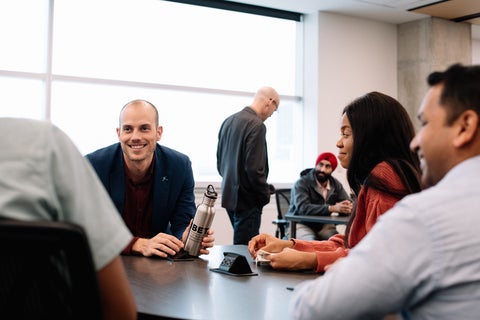Build the skills to move ideas into action
The Master of Business, Entrepreneurship and Technology (MBET) program supports innovative thinkers and problem-solvers who want to create impact in their careers and communities. The program focuses on developing the ability to identify opportunities, validate ideas, and lead projects in environments where information is incomplete and conditions change quickly.
Choose the MBET or add a specialization to tailor your degree to your goals and customize your path.
Beginning fall 2026 (pending final Senate approval), we are introducing optional specializations:
-
Business: Product Management and Innovation
-
Entrepreneurship: New Venture Creation and Commercialization
-
Technology: Artificial Intelligence and Digital Transformations

A practical, applied curriculum
The refreshed MBET curriculum prepares students to work with real challenges, not just theoretical examples.
Coursework integrates opportunity discovery, market validation, data-driven decision-making, business strategy, and innovation leadership.
Students learn how to:
-
Determine what information is needed to make sound decisions
-
Gather and interpret data from real users, markets, and environments
-
Assess opportunities and build viable business and project models
-
Lead initiatives from early concept through execution
-
Communicate recommendations clearly to stakeholders and partners
This applied approach equips students with tools they can use immediately, regardless of industry or sector.
A collaborative community of innovators
MBET students learn alongside a diverse cohort of peers who bring different experiences, disciplines, and perspectives.
Faculty draw on deep experience in innovation, commercialization, and venture-building to provide mentorship and guidance.
Together, this community creates a supportive environment for exploring new ideas and approaches.
Outcomes: graduates who make things happen
MBET graduates become professionals who can move ideas forward. They understand how to validate opportunities, analyze markets, test assumptions, and deliver results.
These skills support a wide range of career paths, including roles in innovation teams, technology companies, emerging industries, consulting, non-profits, and new initiatives of all kinds.
Whether you’re launching your own business or driving innovation inside an organization, MBET gives you the tools, mindset, and network to lead change.

Experiential learning grounded in reality
Experiential learning is central to MBET. Instead of analyzing pre-packaged case studies, students work through problems where the “right” data isn’t provided, they learn how to find it.
Through partner projects, field research, and iterative testing, students develop confidence in navigating ambiguity and making evidence-based decisions.

Curriculum
|
MBET |
Traditional MBA |
|---|---|
|
|
Course Delivery
|
MBET |
Traditional MBA |
|---|---|
|
|
Experiential Learning
|
MBET |
Traditional MBA |
|---|---|
|
|
Class and Faculty Experience
|
MBET |
Traditional MBA |
|---|---|
|
|
Outcomes and Career Paths
|
MBET |
Traditional MBA |
|---|---|
|
|